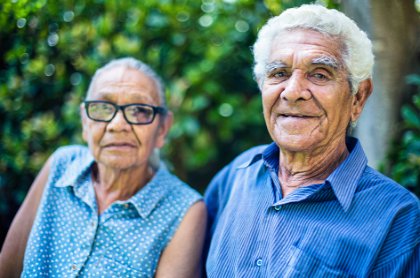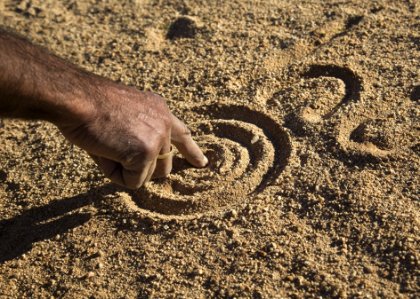Len's story
Len* is an Aboriginal elder from a remote community in central Australia. He has spent most of his adult life working in various remote Aboriginal and Torres Strait Islander communities. He is currently living with Alzheimer’s disease.
 Len and his partner and carer, Sue*, moved away from their home when their place got too much for them to handle. They moved in with family members and for the next few years, there were 4 generations living in the same household. It was a wonderful time but Len started to miss his country and his people. So he decided to return to his community and live in aged care, while Sue rented a unit nearby. But Len was unsettled.
Len and his partner and carer, Sue*, moved away from their home when their place got too much for them to handle. They moved in with family members and for the next few years, there were 4 generations living in the same household. It was a wonderful time but Len started to miss his country and his people. So he decided to return to his community and live in aged care, while Sue rented a unit nearby. But Len was unsettled.
‘Of course [the community] wasn't how he remembered,’ Sue said. ‘There was only a couple of family members left there, the old people that we particularly worked with had passed and the 2 nephew sons that were there said they had had enough of it and were going to [a regional town].’
Len has since moved out of aged care and is back living with Sue. Together they moved closer to their family as it was too far for them to visit. She says prior to Len being diagnosed with dementia, she had started to notice small changes in his behaviour.
‘Things that he normally did he suddenly had lost interest in or just wasn't doing any more – like he used to play solitaire on the computer but he stopped doing that. He was quite a good bush mechanic and he stopped doing that.’
Another time he bought a new set of tools when he already had the same set of tools at home. He did that 3 times.
Sue says not being able to read and write has made it a lot more difficult to manage his dementia.
‘We can't leave out reminder notes and things like that, like you could with someone that can [read]. And sometimes you think, “Now, is this just cultural stuff or is it the dementia?” Like this morning he is looking at the back with the palm tree and he calls it a pine tree … straight away someone else would probably think, “well that’s dementia.” But I know that that's what he was doing long beforehand, and it’s him muddling up English with his [Indigenous] language a bit. Also he's going back to talking [in his] language more … here at home.’
Sue says that in remote communities’ people with dementia tend to be accepted into the community. ‘As long as their behaviour wasn't affecting anyone else, it was sort of just ‘’that’s him’’, and that's the way they are, and that was accepted.’
‘Or anyone whose behaviour becomes a bit bizarre or really abnormal, people would say they are in ‘rama rama’, meaning they not thinking properly in their heads.'
‘Most of the ones in the remote areas are still sort of living in the community with families and managing, but not always managing all that well either.’
Sue says Len has ‘been seen by an ngankari (a traditional  healer) which he likes to see and he has seen them in the past’.
healer) which he likes to see and he has seen them in the past’.
One of the things Len was really missing was sitting down with his own people to chat. ‘That’s something he’s sort of done all his life. Even when he was working, he always went around and sat with the old fellows’. So she got in touch with an Aboriginal community service organisation that provides a meeting place and activities and they now go there twice a week. It’s been an important connection for both of them.
See Dementia among First Nations people for more information on the impact of dementia in Aboriginal and Torres Strait Islander communities.
*This case study is based on an interview with a carer of an Indigenous person who has dementia. This personal account is not necessarily representative of the circumstances of other carers or people with dementia or the challenges they may face, but it is our hope that it will give readers a greater awareness and understanding of the diversity of people’s experiences with dementia.
Names and identifying characteristics have been changed. Images are not representative of individuals in the story.


